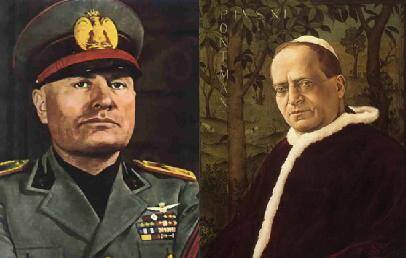One had to wonder, what wasn’t there to like? For half a century, because it had gained its capital in Rome by seizing the Papal States, the Catholic Church had refused to recognize the new state of Italy. In official church teaching, one couldn’t be a good Catholic and a good Italian. Popes, who occupied the Chair of Peter, had lived as virtual prisoners of the Vatican. Once elected, they never left its walls, didn’t even appear at its windows. And so, to church leaders, Benito Mussolini, vulgar and violent as he was, seemed something of an answer to decades of prayer.
As David Kertzer summarizes in his history The Pope and Mussolini (2014), once in power the dictator
showered the Church with cash and privileges. He pushed through a new law allowing police to fire any editor whose newspaper belittled either the pope or the Catholic Church. He bowed to the Vatican’s request that only books approved by the Church be used to teach religion in schools. He agreed to close down gambling halls. He provided state recognition to the Catholic University of Milan, announced his opposition to divorce, and moved to save the Bank of Rome, closely tied to the Vatican, which was on the verge of bankruptcy. Crucifixes were back in the country’s classrooms, and Church holidays were added to the civil calendar. He came up with generous funds to rebuild churches that had been damaged during the war. The list went on and on (63).
Today’s pilgrims to the Eternal City have Mussolini to thank for the straight street, which enters Saint Peter’s Square from the city of Rome. The dictator created a marvelous vista of Saint Peter’s by demolishing the medieval buildings that had once blocked access. In honor of the concord that the church had found with Fascist Italy, the street is still named Via della Conciliazione.
Yet it’s entirely too easy, and too smugly judgmental, simply to say that Pope Pius XI, his Secretary of State Cardinal Pietro Gasparri or even the Jesuit editors of Civiltà Cattolica, who were rather fulsome in praise of the new movement, should have recognized the compromises they made with Mussolini. Hindsight makes everyone saintly and savvy.
For those of us not running the church, or nations, when Christ enjoins us to “repay to Caesar what belongs to Caesar and to God what belongs to God” (Mt 22:21), perhaps the better focus is to ask about our own allegiances to Christ and country.
Catholics with a consciousness of history are embarrassed today by the church’s teaching, first enunciated in the dark ages but repeated well into the 20th century, that civil governments must be subject to the authority of the church. The church’s critics can draw easy comparisons between an earlier Catholicism and Islamic fundamentalism, and there is a basic presupposition, which links the two: shouldn’t Christ come before Caesar, or, as other fundamentalists would put it, God before government?
In itself, the proposition is correct. The problem is the presupposition that God’s work in the world can be identified exclusively with the church, or the Chosen People, or the Ummah, the community of believers in Islam. God is always larger, always more, always beyond any group, whether it be sacred or profane. God’s work in the world can’t be reduced to any creed or government platform.
This isn’t to deny that Christ and the Holy Spirit aren’t present to the church, constantly purifying and strengthening her. It’s simply to acknowledge that, as creatures, we are sustained by God and not the other way around.
In his classic treatise on this topic, The City of God, Saint Augustine charged that
the earthly [city] has made for herself, according to her heart’s desire, false gods out of any sources at all, even out of human beings, that she might adore them with sacrifices. The heavenly one, on the other hand, living like a wayfarer in this world, makes no false gods for herself. On the contrary, she herself is made by the true God that she may be herself a true sacrifice to Him (XVIII.54).
The temptation of every collective human project is to identify itself with the whole, which isn’t a bad definition of an idol. We do it as individuals as well, thinking our vision of the world large enough to encompass the entirety.
Yet the Church still proclaims these words of Isaiah, and others like them:
To acknowledge the dominion of the God, whom we do not fully know, is to forsake the idols, which we ourselves create. That’s a task that should be shared by the sacred and the profane, by individuals and by groups.
Isaiah 45: 1, 4-6 1 Thessalonians 1: 1-5b Matthew 22: 15-2








